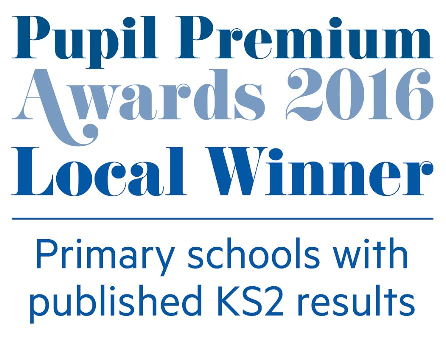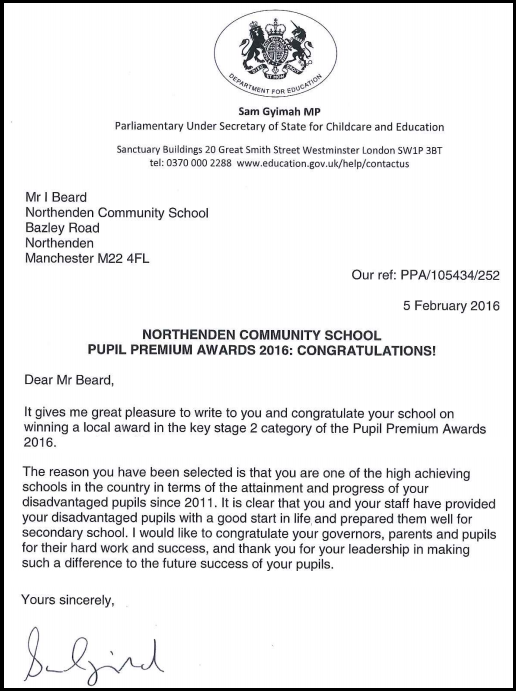|
School Funding
The more pupils a school has in these categories, the more pupil premium funding they receive. Some schools with a pupil population that is highly disadvantaged may receive in excess £250,000 per year in additional funding. At Northenden, we have relatively few pupils who are classed as ‘disadvantaged’; our Pupil Premium funding for pupils entitled to Free School Meals is therefore relatively low. Disadvantaged children represent about 15% of the whole-school population with 9% currently entitled to Free School Meals.. Our funding for the last few years has been as follows:
- 2018 – 2019 : £61,886 (of which £16,100 is post-LAC)
- 2019 – 2020 : £52,006 (of which £11,500 is post-LAC)
The aim of the extra funding is to enable schools to provide additional support and opportunities for disadvantaged children so that schools ‘level the playing field’ and enable these children to do as well as their peers who may not be as disadvantaged. The Pupil Premium can be used to:
- provide additional teaching support for individual or groups of children;
- provide additional activities to enable children to participate in the wider life of the school;
- provide out-of-school activities which will benefit the child.
Pupil Premium Strategy
Barriers Experienced by Pupils
A number of children entitled to the Pupil Premium …
- have complex Special Educational Needs;
- speak and work in English as an Additional Language;
- have limited early literacy experiences which impacts on early reading and phonics;
- are looked-after (fostered) or have been adopted;
- have experienced trauma, neglect or lack of attachment in their early lives;
- are affected by social, emotional and behavioural issues;
- have low self-esteem or self-confidence;
- come from families with low aspirations for attainment and have possibly had a slower start than others in learning basic skills;
- have had limited support at home with early language, reading and writing
- do not have opportunities outside of school to take part in high-quality enrichment experiences because of low interest, low aspirations or low income.
Desired Outcomes for Pupils entitled to Pupil Premium
We aim for pupils entitled to the pupil premium to …
- fulfil their academic potential and achieve standards which are aspirational and challenging in reading, writing and mathematics;
- make good progress in reading, writing and mathematics relative to their starting points;
- benefit from additional support in the classroom, and from external sources (if required), to meet their particular needs;
- increase their ‘cultural capital’ by experiencing a wide range of opportunities outside the classroom, including educational visits and residential visits which are funded by the school
Strategies and Actions
At Northenden, we use our Pupil Premium funding to:
- improve general provision for all pupils and improve quality-first teaching;
- provide additional teaching support for individuals and small groups throughout the year;
- provide additional hours for teaching assistants in every class beyond what would normally be funded (with a limited budget) to support groups of children via additional intervention programmes;
- fund out-of-school activities, including tutoring, counselling or family support, where it has been agreed that these will benefit individual children and have an impact on their learning, self-esteem, mental health and general well-being;
- provide play therapy by a qualified play therapist;
- fund staff costs for after-school study support sessions, e.g. booster, one-to-one;
- purchase high-quality materials for teaching and learning in all subjects;
- provide high-quality training for teachers and teaching assistants to improve subject knowledge and the quality of teaching and learning, particularly in English and Mathematics;
- purchase additional materials and online learning materials which meets specific needs;
- provide support for parents where required;
- fund catch-up programmes delivered by qualified teachers;
- subsidise a wide range of educational visits for pupil premium and all children;
- subsidise residential visits for pupils in Years 5 and 6 for pupil premium children;
- subsidise instrumental tuition for pupil premium children;
- subsidise some enrichment opportunities and activities, including arts and music education.
Outcomes for Disadvantaged Pupils 2019
- In Year 1, 79% of disadvantaged pupils achieved the expected standard in Phonics in 2019 compared to 75% of other pupils.
- In Year 2 NC tests … 50% of disadvantaged pupils achieved the expected standard in Reading compared to 77% of other children; 50% of disadvantaged pupils achieved the expected standard in Writing compared to 73% of other pupils; 75% of disadvantaged pupils achieved the expected standard in Mathematics compared to 65% of other pupils.
- In Year 6 NC tests … 86% of disadvantaged pupils achieved the expected standard in Reading compared to 96% of other pupils; 57% of disadvantaged pupils achieved the expected standard in Writing compared to 86% of other pupils; 100% of disadvantaged pupils achieved the expected standard in Mathematics compared to 88% of other pupils.
- In Year 6, progress measures for disadvantaged pupils (and other pupils) were 5.84 (6.61) in Reading, -0.49 (2.71) in writing and 4.55 (3.26) in Mathematics.
Statistical Significance
Given the relatively low numbers of pupils entitled to Pupil Premium, the outcomes, in terms of percentage statistics, need to considered carefully. For example, in a class with just two pupils entitled to Pupil Premium funding, it is possible that one child achieves the expected level in all of reading, writing and mathematics and one child (perhaps who also has special educational needs) does not. Our pupil premium outcomes would therefore be 50% (of all disadvantaged pupils) which would seem poor compared to a national figure or the number of pupils who are not disadvantaged.
|



